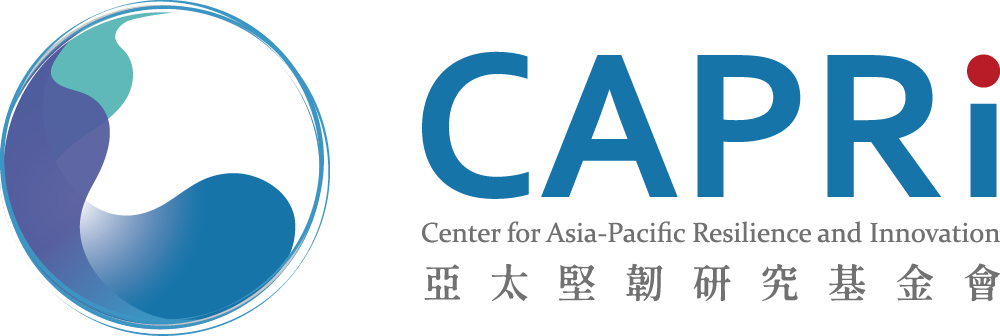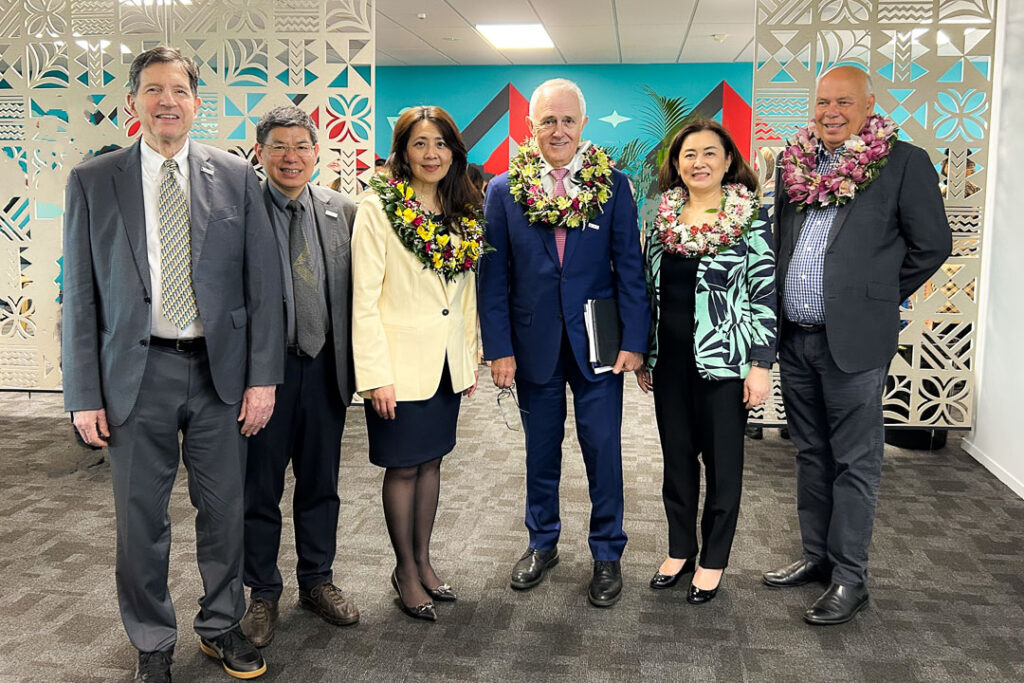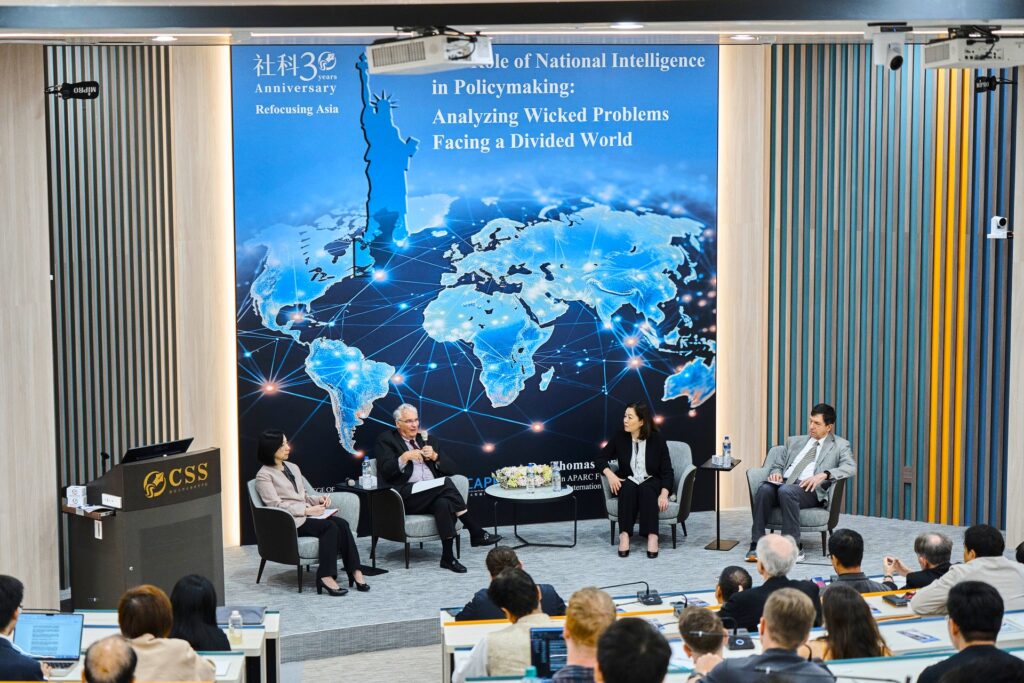Speaking today at the Center for Asia-Pacific Resilience and Innovation (CAPRI)’s Annual Forum in Taipei, experts from across the globe evaluated the disarray the Trump administration has unleashed on the world, and emphasized that the public and private sector in Asia Pacific should offer leadership to a world reeling from rapid change, highlighting its innovative culture as a driving force in its resilient response to recent upheavals.
TAIPEI, 12 MAY 2025 – Asia Pacific should forge its own path between US-China rivalry, says Sir Robin Niblett
Speaking today at the Center for Asia-Pacific Resilience and Innovation (CAPRI)’s Annual Forum in Taipei, experts from across the globe promoted reasons for hope in Taiwan and the Asia Pacific region, despite the international uncertainty, highlighting its innovative culture as a driving force in its resilient response to recent upheavals.
In its third year, the Forum, titled “Building Resilience on Shaky Ground in the Asia Pacific,” focused on the steps to take now to build more resilient societies in the future. The event took place in front of a packed audience in Taipei, with viewers online from across the globe tuning in to hear about the prospects for the Asia Pacific region under unprecedented change.
On his first visit to Taiwan, Distinguished Fellow and former Director and Chief Executive of Chatham House Sir Robin Niblett delivered the opening keynote. He highlighted the ideological incompatibility between the US and China, which will define international relations in the 21st century, with Taiwan and the Asia Pacific at the core of this competition. In navigating this new Cold War, Taiwan must forge its own path for long-term security and prosperity, offering an example for the Asia Pacific, which is caught between the two superpowers of our time. “Bilateral treaty arrangements are vital for its Asia Pacific allies, but [the US] cannot be relied upon in the short term… so you have to become more resilient individually.”
Speaking just moments after the announcement of a deal to reduce US-China tariffs, Kathy Masui, General Partner of MPower Partners and former Policy Commentator in the Cabinet Office of the Government of Japan (2015–2020), stressed that “Japan needs to develop domestic national resilience… [and] unleash and unlock untapped resources” in response to recent shocks, including the rapid imposition and removal of tariffs. This was expanded on by Mara Rudman, a CAPRI Practitioner Senior Fellow, Distinguished Professor at the Miller Center of Public Affairs, University of Virginia, and a Former Deputy Assistant for National Security Affairs to Presidents Obama and Clinton, who noted how international relations with the US are changing, with leaders from other nations “recalculating how to deal with the president of the United States… those doing best are figuring out what their ultimate goals are, what policies they want to achieve and what the politics are of navigating that.” Alicia García Herrero, a CAPRI Board member, Senior Fellow of Bruegel, and Chief Economist for Asia Pacific at Natixis, emphasized that Europe still needs to wake up to the degradation of the liberal order, but its focus on multilateralism can act as a bulwark against great power polarization. The speakers reinforced the idea of enhancing resilience as the ground shakes beneath the Asia Pacific, particularly amid intense economic shocks, and reflected on the increasing use of tariffs in foreign relations by the US, noting the need to rethink existing norms and consider new forms of Indo-Pacific regional collaboration to create more independent and resilient economies.
As the global order undergoes fundamental changes and the principles of free trade are dismantled by the US, the private sector must respond to rapid changes and support the societies they inhabit. Three members of the CAPRI International Advisory Council, chairman of Fubon Group Daniel Tsai, chairman of Temasek Holdings Lim Boon Heng, and chairman and CEO of Suntory Holdings Takeshi Niinami, underscored the leadership role Asian companies can take in fostering green technology, advancing responsible investment and economic practices, and placing resilience at the heart of society as governments become stretched thin and less able to cope with a tumultuous world order. Daniel Tsai urged the private sector to advance sustainability in the region, stressing “there is only one earth, and it is ours. We need to protect it. If the public sector cannot take the leading role, business leaders should make ESG the DNA of business.” Lim Boon Heng touched on the importance of an educated workforce for social resilience, “smart economies take a long-term view and invest in education, developing good schools and universities. Everywhere, investors look for economies that invest in their people.” Takeshi Niinami asserted the need for “multi-scenario planning” in business to foster resilience, and enthused at recent work he and other business leaders in Japan have carried out to work closely with civil society, building public trust in the private sector and meaningfully contributing to enhanced sustainability in the country.
Building on the theme of enhancing resilience amid systemic shocks, speakers from the Pacific Islands emphasized the need for building regional partnerships and sharing best practices to address the dual challenge of climate and health. Deputy Minister of Health and Welfare of the Republic of China (Taiwan) and former Coordinator of the Taiwan Medical Mission in Tuvalu Lin Ching-Yi opened the session by highlighting the Pacific’s importance to Taiwan, noting the government’s determination to support allies in the region and go beyond geopolitics to address the Pacific Islands’ interests: developing resilient, climate-proof health systems. The Minister highlighted that since 2006 Taiwan has offered medical training, services and equipment to its diplomatic countries across the Pacific, in part because “we are sisters and brothers with the Pacific countries…the South Pacific is an important partner and region for greater international collaboration.” In the subsequent discussion, Co-Directors of Te Poutoko Ora a Kiwa – Centre for Pacific and Global Health at the University of Auckland, Sir Collin Tukuitonga (also a CAPRI Senior Fellow) and Li’amanaia Roannie Ng Shiu, and Executive Director of the Pacific Islands Health Officers Association Emi Chutaro highlighted regional collaboration in the Pacific. Since 2023, the three speakers have partnered with CAPRI to lead Pacific Islands research for the World Economic Forum-affiliated Partnership for Health System Sustainability and Resilience (PHSSR), bringing together experts from across Asia Pacific to give the often-overlooked region a global platform. Sir Collin referred to the “tyranny of distance” in addressing the needs of the region, with small health systems spread over thousands of kilometers creating logistical challenges, while Li’amanaia Roannie Ng Shiu offered a stark warning against inactivity in the region – “By 2030, 1 in 6 people in the Pacific will not have access to fresh water… the Pacific will need at least $1billion a year to adapt to the changing climate… the region cannot adapt fast enough on its own, so will require international collaboration to overcome the issues.” Emi Chutaro echoed this sentiment, noting the new reality of reduced US federal funding is creating “a time of chaos, but also a time of survival” for the Pacific region as it grapples with the dual health-climate threat.
Chen Ming-chi, Deputy Minister of Foreign Affairs of the Republic of China (Taiwan), addressed Taiwan’s need to foster collaboration to maintain innovation while remaining vigilant of security risks. The Minister emphasized the challenges Taiwanese students experience in China, meaning “true academic exchange is impossible”, but Taiwan’s own student exchange continues to prosper with likeminded nations across the world. Following his opening remarks, CAPRI International Advisory Council member, Academician of Academia Sinica, and Former President of The Hong Kong University of Science and Technology Wei Shyy joined CAPRI Board member, Yushan Scholar at National Chengchi University, and Founding Dean of the Frank Batten School of Leadership and Public Policy at the University of Virginia Harry Harding along with the Executive Director of the Foundation for Scholarly Exchange (Fulbright Taiwan) Randall Nadeau to reflect on the debate over US–China academic decoupling. They called for a reexamination of regional collaboration on research, exchange, and talent cultivation as the US cuts research funding and deprioritizes international exchange in the second Trump administration. Despite the recent reductions in funding, Randall Nadeau highlighted the growing interest in US-Taiwan student exchange, while language studies are becoming increasingly important, which offers a big opportunity for Taiwan to develop its binational exchange, as China becomes less appealing for foreign students. Reflecting on his own opportunities to travel and study abroad, Harry Harding believes that the “opportunity to see how other countries address similar problems” is critical for shining a mirror on one’s own values and in determining what society we wish to create for future generations. Considering the wider research context, Wei Shyy opined that ‘decoupling is not practical’ and does not solve the problem, as many major journals still have articles with authors from China, the US and elsewhere, and further efforts to stratify academia will only stifle international research.
Mayor Chiang Wan-An of Taipei delivered closing remarks on how global shifts have local impacts. Mayor Chiang highlighted his efforts to transform Taipei into a more resilient city by investing in smart city technology, attracting diverse talent, and improving disaster response. As part of his address, the Mayor emphasized the focus on ‘big impact, small footprint’ in public works, highlighting a $200 million investment in water and flood management and the continued efforts to prevent the 20 million attempted cyber attacks Taipei City government faces every year.
In concluding the Forum, Vice Chair of CAPRI’s International Advisory Council and Chairman of the Observer Research Foundation Sunjoy Joshi praised efforts in the region, Taiwan, and those of CAPRI to build resilience – “the true measure of power” – in the face of international uncertainty, emphasizing the importance of understanding our own strengths and weaknesses, adapting to continual change, as the basis of building a sustainable future.



